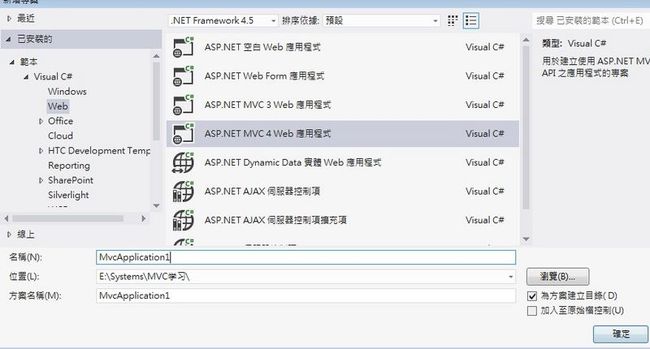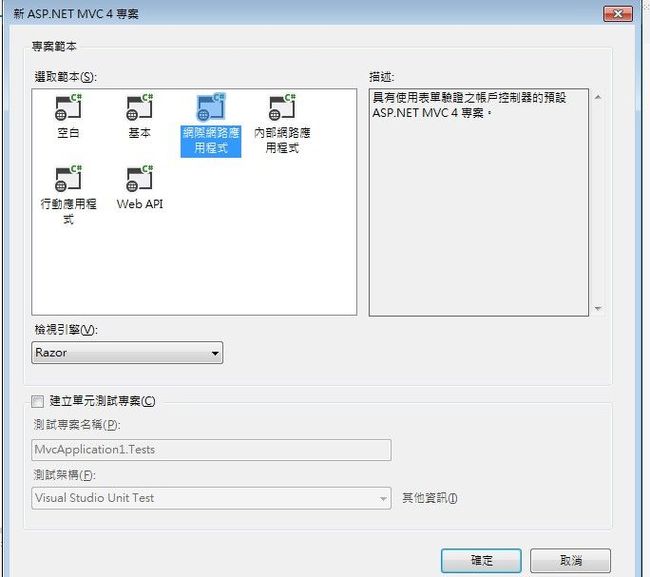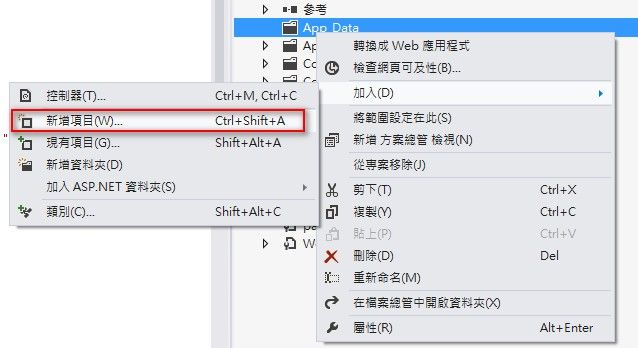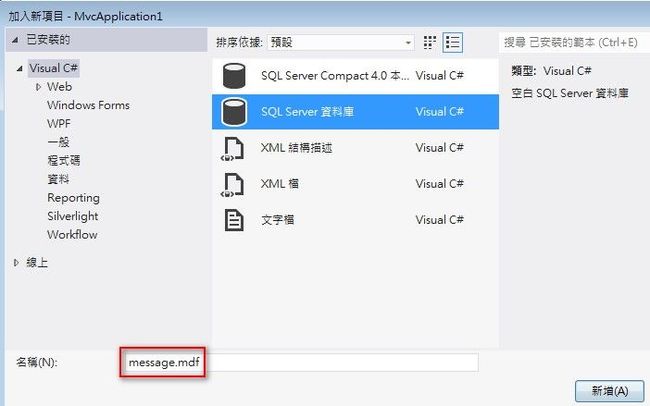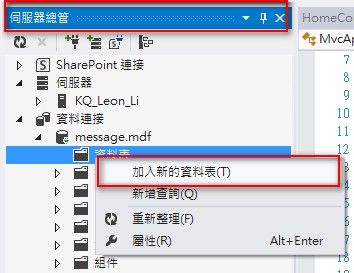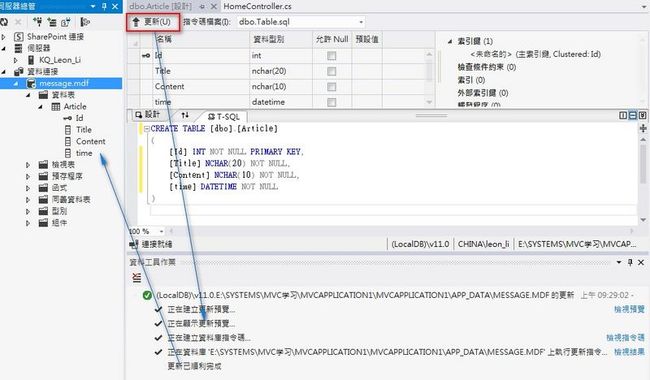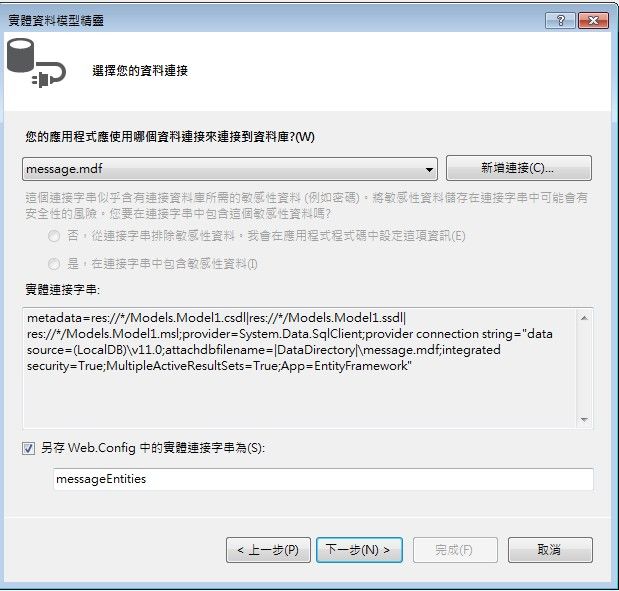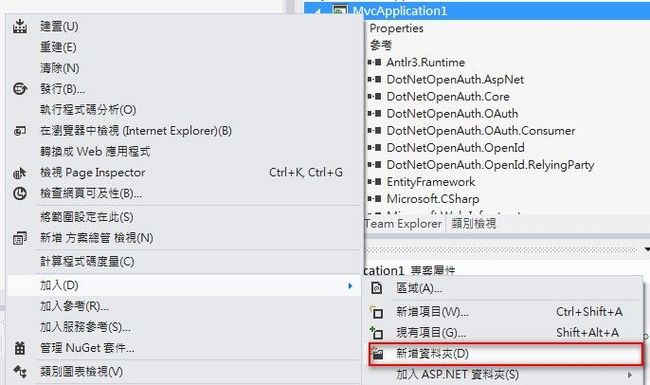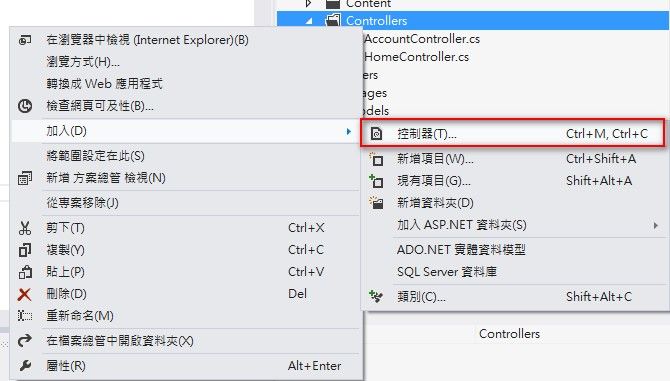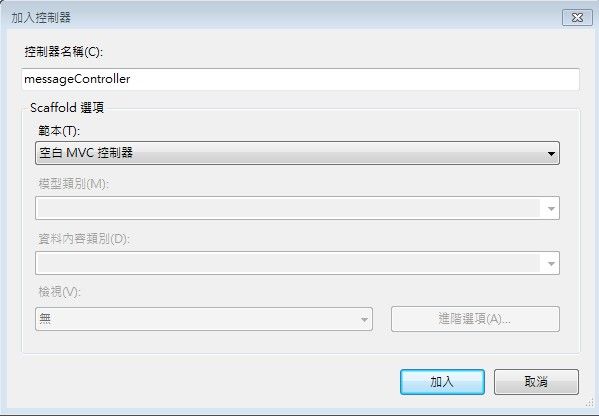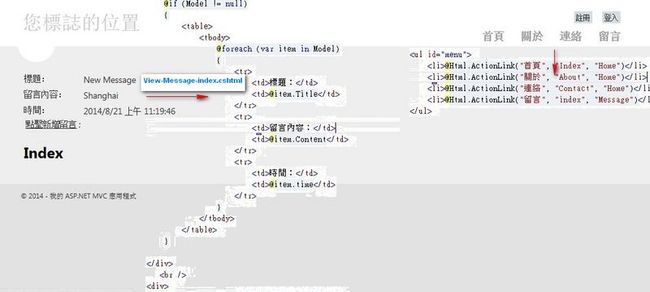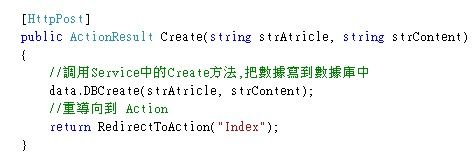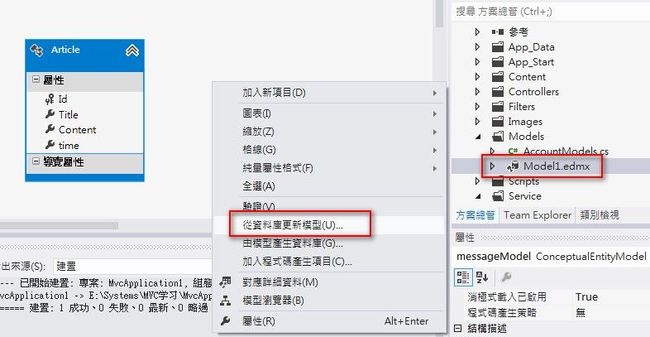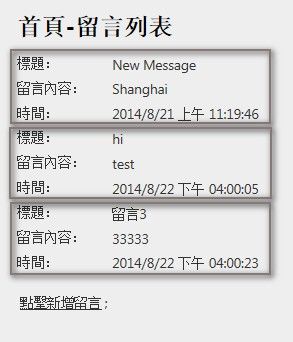- HTML编辑器CKEDITOR支持哪些格式的WORD内容导入?
2501_90699640
html编辑器wordckeditor粘贴wordckeditor导入wordckeditor导入pdfckeditor导入ppt
要求:开源,免费,技术支持编辑器:ckeditor前端:vue2,vue3.vue-cli后端:asp,java,jsp,springboot,php,asp.net,.netcore功能:导入Word,导入Excel,导入PPT(PowerPoint),导入PDF,复制粘贴word,导入微信公众号内容,web截屏平台:Windows,macOS,Linux,RedHat,Ubuntu,CentO
- 推荐文章:ASP.NET Core Markdown 支持
汤萌妮Margaret
推荐文章:ASP.NETCoreMarkdown支持Westwind.AspNetCore.MarkdownAnASP.NETCoreMarkdownsupportlibrarythatprovidesMarkdownparsing,aMarkdownTagHelperandMarkdownPageHandlerMiddleware项目地址:https://gitcode.com/gh_mirro
- 基于ASP.NET校园二手交易网站设计与实现
汐泽学园
asp.net后端
摘要校园二手交易市场伴随互联网技术的迅猛发展以及校园内资源共享需求的增长而逐渐兴起。基于ASP.NET开发的校园二手交易网站,目的在于为高校师生打造一个便捷、安全且高效的二手物品交易平台。此网站借助ASP.NET技术开展开发工作,并且结合SQLServer数据库来存储数...关键词ASP.NET;校园二手交易;网站设计AbstractWiththerapiddevelopmentofInterne
- 基于asp.NET的病历管理系统 (源码+net+vue+部署文档+讲解等)
qq_1406299528
计算机毕业设计aspasp.netvue.js后端
收藏关注不迷路!!文末获取源码+数据库感兴趣的可以先收藏起来,还有大家在毕设选题(免费咨询指导选题),项目以及论文编写等相关问题都可以给我留言咨询,希望帮助更多的人文章目录前言程序资料获取一、项目技术二、项目内容和功能介绍三、核心代码数据库参考四、效果图五、资料获取前言博主介绍:✨全网粉丝10W+,CSDN特邀作者、博客专家、CSDN新星计划导师,专注于Java/Python/小程序app/深度学
- ASP.NET Core 项目 - 汽车租赁系统教程
齐游菊Rosemary
ASP.NETCore项目-汽车租赁系统教程项目地址:https://gitcode.com/gh_mirrors/as/ASP.NET-Core-Project-Car-Renting-System1、项目介绍ASP.NETCore项目-汽车租赁系统是一个基于ASP.NETCore框架的开源项目,旨在提供一个完整的汽车租赁管理系统。该项目包含了用户管理、车辆管理、租赁订单管理等功能模块,适用于中
- 基于Asp.net的汽车租赁管理系统
计算机学姐
Asp精选实战项目源码asp.net汽车后端mysqlsqlservervue.jsc#
作者:计算机学姐开发技术:SpringBoot、SSM、Vue、MySQL、JSP、ElementUI、Python、小程序等,“文末源码”。专栏推荐:前后端分离项目源码、SpringBoot项目源码、Vue项目源码、SSM项目源码、微信小程序源码精品专栏:Java精选实战项目源码、Python精选实战项目源码、大数据精选实战项目源码系统展示【2025最新】基于Asp.net的汽车租赁管理系统开发
- 快速上手:ASP.NET Core MVC 与 EF Core 操作 MySQL 数据库完整实例
殷连靖Harlan
快速上手:ASP.NETCoreMVC与EFCore操作MySQL数据库完整实例【下载地址】ASP.NETCoreMVC使用EF操作MySQL数据库完整实例ASP.NETCoreMVC使用EF操作MySQL数据库完整实例本资源提供了一套完整的示例项目,展示了如何在ASP.NETCoreMVC应用程序中使用EntityFramework(EF)来操作MySQL数据库项目地址:https://gitc
- ASP.NET CORE MVC EF框架
sanzk
ASP.NETCOREEF
1.一个视图中的多个表单Form中的变量。方式一:视图中跨Form变量不能用,得各自定义变量否则编译不能通过。变量名还不能相同。或者方式二:在Form之外定义变量@{ViewData["Title"]="ExpenseForm";}@{Layout=null;}ExpenseFormdiv,table,tr,td{margin:0px;padding:0px;}.myTable{width:60
- ASP.NET Core与ASP.NET MVC的核心差异解析
AitTech
.Netasp.netmvc后端
ASP.NETCore与ASP.NETMVC都是微软提供的Web开发框架,但它们之间存在一些显著的区别。ASP.NETCoreASP.NETCore是一个免费且开放源代码的Web框架,由微软和社区共同开发。它是一个模块化框架,既可以在Windows上的完整.NETFramework上运行,也可以在跨平台的.NETCore(现已更名为.NET5及更高版本中的.NET)上运行。ASP.NETCore应
- ASP.NET MVC结合EF入门开发
Morii69
C#linq数据库c#mvc
目录简述ASP.NETMVC先了解一下ASP.NETMVC和EF的基本概念。创建一个ASP.NEtMVC项目。安装完成后,我们需要创建数据库上下文类。接下来,我们需要创建模型类。接下来我们需要创建控制器类。最后我们需要创建视图文件。总结简述ASP.NETMVCASP.NETMVC(Model-View-Controller)是一种用于构建Web应用程序的开发模式,而EntityFramework(
- ASP.NET MVC5+EF6+EasyUI 后台管理系统(51)-系统升级
weixin_34245749
测试javascript游戏ViewUI
系统很久没有更新内容了,期待已久的更新在今天发布了,最近花了2个月的时间每天一点点,从原有系统MVC4+EF5+UNITY2.X+Quartz2.0+easyui1.3.4无缝接入MVC5+EF6+Unity4.x+Quartz2.3+easyui1.4.3.并以easyui1.4.3的gray皮肤为基础,升级10个扁平化皮肤皮肤查看地址更新的主要目的:新的MVC5特性和更好的性能记录一下升级过程
- ASP.NET站点配置以及VS2008下C#、JavaScript联合调试(Ajax) ----以最短路径Dijstra最短路问题为例
刘一哥GIS
《VS/C/C++/C#》ASP.NETIIS最短路径ajax
实验任务描述:用VS2008构造ASP.NET站点开发环境;用ASP.NET完成JavaScript开发调试;用Ext3.0.0完成一个简单的树显示站;WebService程序设计,Dijstra最短路Web服务;JavaScript通过Ajax技术调用WebService;一、Windows下WEB共享设置打开你的WINDOWS,鼠标点开“我的电脑”,寻找下你机器的WINDOWS版本信息,如果你
- 报表控件stimulsoft操作:使用 Angular 应用程序的报告查看器组件
CodeCraft Studio
控件angular.js前端javascript
StimulsoftUltimate(原StimulsoftReports.Ultimate)是用于创建报表和仪表板的通用工具集。该产品包括用于WinForms、ASP.NET、.NETCore、JavaScript、WPF、PHP、Java和其他环境的完整工具集。无需比较产品功能,StimulsoftUltimate包含了所有内容!StimulsoftReports最新版下载介绍报告和仪表板查看
- 在 ASP.NET Core WebAPI 中使用 JWT 验证
.NET跨平台
ASP.NETCoreWebAPIIdentityServer4OAuth2.0协议.NETCOREWEBAPIJWT
为了保护WebAPI仅提供合法的使用者存取,有很多机制可以做,透过JWT(JSONWebToken)便是其中一种方式,这篇示范如何使用官方所提供的System.IdentityModel.Tokens.Jwt扩充套件,处理呼叫API的来源是否为合法的使用者身分。顺道一提,要产生JWTToken有很多套件可以帮助开发者快速建立,JWT这个NuGet套件就是其中一个,但这裡我使用官方所提供的Syste
- 如何通过 DeepSeek 开发一个简单的 AI 辅助工具?
借雨醉东风
人工智能
关注我,持续分享逻辑思维&管理思维&面试题;可提供大厂面试辅导、及定制化求职/在职/管理/架构辅导;推荐专栏《10天学会使用asp.net编程AI大模型》,目前已完成所有内容。一顿烧烤不到的费用,让人能紧跟时代的浪潮。从普通网站,到公众号、小程序,再到AI大模型网站。干货满满。学成后可接项目赚外快,绝对划算。不仅学会如何编程,还将学会如何将AI技术应用到实际问题中,为您的职业生涯增添一笔宝贵的财富
- 构建基于ASP.NET的教务管理系统
黃昱儒
本文还有配套的精品资源,点击获取简介:教务管理系统是一个Web应用程序,利用ASP.NET技术为高校和教育机构提供全面的教务管理功能。它包括学生信息管理、课程管理、考试安排和成绩录入等核心模块。系统支持权限控制和数据管理,以确保信息安全和操作便捷。ASP.NET框架使用C#或VB.NET编程,结合.NETFramework、SQLServer或MySQL数据库以及前端技术(HTML、CSS、Jav
- ASP.NET教务信息管理系统的设计与实现(源代码+论文)
技术宅小伙
asp.net后端
随着我国教育事业的不断发展,各级教育层次的教学规模日益扩大,采用传统的教务信息管理方法(如直接手工管理或者开发程度不高的管理系统)不但浪费大量人力、物力和财力资源,而且不能满足当前教育发展的需求。教务信息管理系统是一种融合管理科学、信息科学、系统科学和计算机技术为一体的综合性先进管理手段。系统是建立在WINDOWS操作系统上的基于C/S(客户机/服务器)模式的教务信息管理系统,选用VB.NET+S
- Abp框架
科学的发展-只不过是读大自然写的代码
c#
基于DDD的现代ASP.NET开发框架–ABP系列文章总目录什么是ASP.NETBoilerplateProject(ABP)框架【DDD】领域驱动设计实践——框架实现DDD分层架构的三种模式【DDD】领域驱动设计实践——Domain层实现ABP框架-会话https://cn.abp.io领域驱动设计https://www.jianshu.com/p/89dfcd672d43https://blo
- Asp.net WebAPi gzip压缩和json格式化
weixin_34192816
jsonc#
现在webapi越来越流行了,很多时候它都用来做接口返回json格式的数据,webapi原本是根据客户端的类型动态序列化为json和xml的,但实际很多时候我们都是序列化为json的,所以webapi的序列化比我们用ServiceStack.Text序列化要多花费一些时间,还有如果返回的数据量比较大那么我们应该启动gzip和deflate压缩。而这些实现都不得影响现有的code,我个人喜欢同时也是
- asp.net core使用gzip
weixin_30663471
c#测试json
http://www.talkingdotnet.com/how-to-enable-gzip-compression-in-asp-net-core/转载于:https://www.cnblogs.com/94pm/p/9063128.html
- ASP.NET Core自定义认证和授权搭建流程(使用JWT)
woshihedayu
asp.net后端
asp.netcore本身就自带了认证和授权框架,其中包含了Identity框架,可以自动生成相关的数据库表结构,调用UserManager、RoleManager、SiginManager这些服务,可以自动生成SQL语句访问用户、角色等功能。但是不同的项目,业务功能不一样,Identity自动生成的表结构并不符合所有项目的业务需求,所以我不太看好使用Identity框架来搭建项目,这里总结一下使
- ASP.NET Core 响应压缩中间件
weixin_34210740
json测试
为什么80%的码农都做不了架构师?>>>使用及对比在Startup.cs中添加服务并使用即可,主代码如下://Startup.cspublicvoidConfigureServices(IServiceCollectionservices){//...services.AddResponseCompression();//...}publicvoidConfigure(IApplicationBu
- ASP.NET CORE JWT认证
begeneral
ASP.NETCOREasp.netcorejwt
ASP.NETCORE版本:.NET5.0关于JWT的基础知识,请大家上网搜一下,这里主要从代码层面讲解。首先新建一个ASP.NETCOREWebapi的空项目,然后新建一个LoginController的api控制器。从nuget中安装包:Microsoft.AspNetCore.Authentication.JwtBearer;1、生成Token先看代码:[Route("api/[contro
- ASP.NET MVC 网站优化总结 使用 Gzip 压缩
飞鸟flyboy
服务器安全常用技巧
1.开GZIP有什么好处?答:Gzip开启以后会将输出到用户浏览器的数据进行压缩的处理,这样就会减小通过网络传输的数据量,提高浏览的速度。2.如何启用IIS的Gzip压缩功能:答:首先,如果你需要压缩静态文件(HTML),需要在硬盘上建一个目录,并给它“IUSR_机器名”这个用户的写权限。如果压缩动态文件(PHP,asp,aspx)就不需要了,因为它的页面是每次都动态生成的,压缩完就放弃。然后在I
- ASP.NET Core实现JWT授权与认证
CodeBandit
asp.net后端.NET
在ASP.NETCore应用程序中,可以使用JWT(JSONWebToken)进行授权和认证,以实现安全的身份验证和访问控制。JWT是一种基于JSON的开放标准,用于在各方之间安全地传输信息。它由三个部分组成:头部(Header)、负载(Payload)和签名(Signature)。下面是一个详细的步骤,展示如何在ASP.NETCore应用程序中实现JWT授权与认证。添加所需的NuGet包在项目中
- ASP.NET Core JWT认证与授权
chenbin520
asp.net后端JWT
1.JWT结构JSONWebToken(JWT)是一种用于在网络应用之间安全传输声明的开放标准(RFC7519)。它通常由三部分组成,以紧凑的字符串形式表示,在身份验证、信息交换等场景中广泛应用。2.JWT权限认证2.1添加认证服务类在Program类中添加认证服务、Jwt处理类以及JWT配置项。//配置JWT身份验证builder.Services.AddAuthentication(JwtBe
- 7步轻松掌握ASP.NET Core API网关Ocelot,你get到了吗?
墨瑾轩
一起学学C#【七】asp.net后端
关注墨瑾轩,带你探索编程的奥秘!超萌技术攻略,轻松晋级编程高手技术宝库已备好,就等你来挖掘订阅墨瑾轩,智趣学习不孤单即刻启航,编程之旅更有趣7步轻松掌握ASP.NETCoreAPI网关Ocelot,你get到了吗?前言亲爱的小伙伴们,大家好!今天我们来聊聊一个非常实用的话题——如何在ASP.NETCore中使用Ocelot构建API网关。API网关是微服务架构中的一个重要组件,它充当了所有客户端请
- ASP.NET如何判断IP地址是否在某个IP的范围内实例
CsharpDev-奶豆哥
tcp/ip网络协议网络ip
在ASP.NET中,判断一个IP地址是否在某个IP范围内可以通过以下步骤实现:将IP地址转换为整数:IP地址(IPv4)可以转换为一个32位整数,方便进行范围比较。比较整数形式的IP地址:将目标IP地址和范围的最小、最大IP地址转换为整数后进行比较。以下是具体的实现方法。1.将IP地址转换为整数IPv4地址由4个字节组成(如192.168.1.1),可以将其转换为一个32位整数。例如:192.16
- 浅谈ASP.NET Core MVC架构
David Hongyu
ASP.NETCOREMVC
要使用好ASP.NETCoreMVC,首先需要理解什么是MVC开发模式什么是MVC模式?首先,给出定义:MVC是Model-View-Controller的缩写。Model(模型)-View(视图)-Controller(控制器)是一个用于实现图形用户界面(GUI)程序的软件架构模式。划重点:MVC模式是一种GUI程序的架构模式。当我们讨论软件开发时,模式指常规角色的组合。在一种模式中,每个角色都
- ASP.NET Core中间件(Middleware)和过滤器(Filter)的区别
.NET跨平台
ASP.NETCoreWebAPIasp.net中间件后端
在ASP.NETCore中,中间件(Middleware)和过滤器(Filter)都可以在请求处理过程中执行逻辑,但它们的作用范围、执行阶段和使用场景有所不同。1.中间件(Middleware)概念中间件是ASP.NETCore请求处理管道的一部分,每个中间件可以:处理请求(完全拦截请求并生成响应)。修改请求并将其传递给下一个中间件。处理响应(在响应返回前修改它)。特点全局作用:应用程序级别的请求
- 集合框架
天子之骄
java数据结构集合框架
集合框架
集合框架可以理解为一个容器,该容器主要指映射(map)、集合(set)、数组(array)和列表(list)等抽象数据结构。
从本质上来说,Java集合框架的主要组成是用来操作对象的接口。不同接口描述不同的数据类型。
简单介绍:
Collection接口是最基本的接口,它定义了List和Set,List又定义了LinkLi
- Table Driven(表驱动)方法实例
bijian1013
javaenumTable Driven表驱动
实例一:
/**
* 驾驶人年龄段
* 保险行业,会对驾驶人的年龄做年龄段的区分判断
* 驾驶人年龄段:01-[18,25);02-[25,30);03-[30-35);04-[35,40);05-[40,45);06-[45,50);07-[50-55);08-[55,+∞)
*/
public class AgePeriodTest {
//if...el
- Jquery 总结
cuishikuan
javajqueryAjaxWebjquery方法
1.$.trim方法用于移除字符串头部和尾部多余的空格。如:$.trim(' Hello ') // Hello2.$.contains方法返回一个布尔值,表示某个DOM元素(第二个参数)是否为另一个DOM元素(第一个参数)的下级元素。如:$.contains(document.documentElement, document.body); 3.$
- 面向对象概念的提出
麦田的设计者
java面向对象面向过程
面向对象中,一切都是由对象展开的,组织代码,封装数据。
在台湾面向对象被翻译为了面向物件编程,这充分说明了,这种编程强调实体。
下面就结合编程语言的发展史,聊一聊面向过程和面向对象。
c语言由贝尔实
- linux网口绑定
被触发
linux
刚在一台IBM Xserver服务器上装了RedHat Linux Enterprise AS 4,为了提高网络的可靠性配置双网卡绑定。
一、环境描述
我的RedHat Linux Enterprise AS 4安装双口的Intel千兆网卡,通过ifconfig -a命令看到eth0和eth1两张网卡。
二、双网卡绑定步骤:
2.1 修改/etc/sysconfig/network
- XML基础语法
肆无忌惮_
xml
一、什么是XML?
XML全称是Extensible Markup Language,可扩展标记语言。很类似HTML。XML的目的是传输数据而非显示数据。XML的标签没有被预定义,你需要自行定义标签。XML被设计为具有自我描述性。是W3C的推荐标准。
二、为什么学习XML?
用来解决程序间数据传输的格式问题
做配置文件
充当小型数据库
三、XML与HTM
- 为网页添加自己喜欢的字体
知了ing
字体 秒表 css
@font-face {
font-family: miaobiao;//定义字体名字
font-style: normal;
font-weight: 400;
src: url('font/DS-DIGI-e.eot');//字体文件
}
使用:
<label style="font-size:18px;font-famil
- redis范围查询应用-查找IP所在城市
矮蛋蛋
redis
原文地址:
http://www.tuicool.com/articles/BrURbqV
需求
根据IP找到对应的城市
原来的解决方案
oracle表(ip_country):
查询IP对应的城市:
1.把a.b.c.d这样格式的IP转为一个数字,例如为把210.21.224.34转为3524648994
2. select city from ip_
- 输入两个整数, 计算百分比
alleni123
java
public static String getPercent(int x, int total){
double result=(x*1.0)/(total*1.0);
System.out.println(result);
DecimalFormat df1=new DecimalFormat("0.0000%");
- 百合——————>怎么学习计算机语言
百合不是茶
java 移动开发
对于一个从没有接触过计算机语言的人来说,一上来就学面向对象,就算是心里上面接受的了,灵魂我觉得也应该是跟不上的,学不好是很正常的现象,计算机语言老师讲的再多,你在课堂上面跟着老师听的再多,我觉得你应该还是学不会的,最主要的原因是你根本没有想过该怎么来学习计算机编程语言,记得大一的时候金山网络公司在湖大招聘我们学校一个才来大学几天的被金山网络录取,一个刚到大学的就能够去和
- linux下tomcat开机自启动
bijian1013
tomcat
方法一:
修改Tomcat/bin/startup.sh 为:
export JAVA_HOME=/home/java1.6.0_27
export CLASSPATH=$CLASSPATH:$JAVA_HOME/lib/tools.jar:$JAVA_HOME/lib/dt.jar:.
export PATH=$JAVA_HOME/bin:$PATH
export CATALINA_H
- spring aop实例
bijian1013
javaspringAOP
1.AdviceMethods.java
package com.bijian.study.spring.aop.schema;
public class AdviceMethods {
public void preGreeting() {
System.out.println("--how are you!--");
}
}
2.beans.x
- [Gson八]GsonBuilder序列化和反序列化选项enableComplexMapKeySerialization
bit1129
serialization
enableComplexMapKeySerialization配置项的含义
Gson在序列化Map时,默认情况下,是调用Key的toString方法得到它的JSON字符串的Key,对于简单类型和字符串类型,这没有问题,但是对于复杂数据对象,如果对象没有覆写toString方法,那么默认的toString方法将得到这个对象的Hash地址。
GsonBuilder用于
- 【Spark九十一】Spark Streaming整合Kafka一些值得关注的问题
bit1129
Stream
包括Spark Streaming在内的实时计算数据可靠性指的是三种级别:
1. At most once,数据最多只能接受一次,有可能接收不到
2. At least once, 数据至少接受一次,有可能重复接收
3. Exactly once 数据保证被处理并且只被处理一次,
具体的多读几遍http://spark.apache.org/docs/lates
- shell脚本批量检测端口是否被占用脚本
ronin47
#!/bin/bash
cat ports |while read line
do#nc -z -w 10 $line
nc -z -w 2 $line 58422>/dev/null2>&1if[ $?-eq 0]then
echo $line:ok
else
echo $line:fail
fi
done
这里的ports 既可以是文件
- java-2.设计包含min函数的栈
bylijinnan
java
具体思路参见:http://zhedahht.blog.163.com/blog/static/25411174200712895228171/
import java.util.ArrayList;
import java.util.List;
public class MinStack {
//maybe we can use origin array rathe
- Netty源码学习-ChannelHandler
bylijinnan
javanetty
一般来说,“有状态”的ChannelHandler不应该是“共享”的,“无状态”的ChannelHandler则可“共享”
例如ObjectEncoder是“共享”的, 但 ObjectDecoder 不是
因为每一次调用decode方法时,可能数据未接收完全(incomplete),
它与上一次decode时接收到的数据“累计”起来才有可能是完整的数据,是“有状态”的
p
- java生成随机数
cngolon
java
方法一:
/**
* 生成随机数
* @author
[email protected]
* @return
*/
public synchronized static String getChargeSequenceNum(String pre){
StringBuffer sequenceNum = new StringBuffer();
Date dateTime = new D
- POI读写海量数据
ctrain
海量数据
import java.io.FileOutputStream;
import java.io.OutputStream;
import org.apache.poi.xssf.streaming.SXSSFRow;
import org.apache.poi.xssf.streaming.SXSSFSheet;
import org.apache.poi.xssf.streaming
- mysql 日期格式化date_format详细使用
daizj
mysqldate_format日期格式转换日期格式化
日期转换函数的详细使用说明
DATE_FORMAT(date,format) Formats the date value according to the format string. The following specifiers may be used in the format string. The&n
- 一个程序员分享8年的开发经验
dcj3sjt126com
程序员
在中国有很多人都认为IT行为是吃青春饭的,如果过了30岁就很难有机会再发展下去!其实现实并不是这样子的,在下从事.NET及JAVA方面的开发的也有8年的时间了,在这里在下想凭借自己的亲身经历,与大家一起探讨一下。
明确入行的目的
很多人干IT这一行都冲着“收入高”这一点的,因为只要学会一点HTML, DIV+CSS,要做一个页面开发人员并不是一件难事,而且做一个页面开发人员更容
- android欢迎界面淡入淡出效果
dcj3sjt126com
android
很多Android应用一开始都会有一个欢迎界面,淡入淡出效果也是用得非常多的,下面来实现一下。
主要代码如下:
package com.myaibang.activity;
import android.app.Activity;import android.content.Intent;import android.os.Bundle;import android.os.CountDown
- linux 复习笔记之常见压缩命令
eksliang
tar解压linux系统常见压缩命令linux压缩命令tar压缩
转载请出自出处:http://eksliang.iteye.com/blog/2109693
linux中常见压缩文件的拓展名
*.gz gzip程序压缩的文件
*.bz2 bzip程序压缩的文件
*.tar tar程序打包的数据,没有经过压缩
*.tar.gz tar程序打包后,并经过gzip程序压缩
*.tar.bz2 tar程序打包后,并经过bzip程序压缩
*.zi
- Android 应用程序发送shell命令
gqdy365
android
项目中需要直接在APP中通过发送shell指令来控制lcd灯,其实按理说应该是方案公司在调好lcd灯驱动之后直接通过service送接口上来给APP,APP调用就可以控制了,这是正规流程,但我们项目的方案商用的mtk方案,方案公司又没人会改,只调好了驱动,让应用程序自己实现灯的控制,这不蛋疼嘛!!!!
发就发吧!
一、关于shell指令:
我们知道,shell指令是Linux里面带的
- java 无损读取文本文件
hw1287789687
读取文件无损读取读取文本文件charset
java 如何无损读取文本文件呢?
以下是有损的
@Deprecated
public static String getFullContent(File file, String charset) {
BufferedReader reader = null;
if (!file.exists()) {
System.out.println("getFull
- Firebase 相关文章索引
justjavac
firebase
Awesome Firebase
最近谷歌收购Firebase的新闻又将Firebase拉入了人们的视野,于是我做了这个 github 项目。
Firebase 是一个数据同步的云服务,不同于 Dropbox 的「文件」,Firebase 同步的是「数据」,服务对象是网站开发者,帮助他们开发具有「实时」(Real-Time)特性的应用。
开发者只需引用一个 API 库文件就可以使用标准 RE
- C++学习重点
lx.asymmetric
C++笔记
1.c++面向对象的三个特性:封装性,继承性以及多态性。
2.标识符的命名规则:由字母和下划线开头,同时由字母、数字或下划线组成;不能与系统关键字重名。
3.c++语言常量包括整型常量、浮点型常量、布尔常量、字符型常量和字符串性常量。
4.运算符按其功能开以分为六类:算术运算符、位运算符、关系运算符、逻辑运算符、赋值运算符和条件运算符。
&n
- java bean和xml相互转换
q821424508
javabeanxmlxml和bean转换java bean和xml转换
这几天在做微信公众号
做的过程中想找个java bean转xml的工具,找了几个用着不知道是配置不好还是怎么回事,都会有一些问题,
然后脑子一热谢了一个javabean和xml的转换的工具里,自己用着还行,虽然有一些约束吧 ,
还是贴出来记录一下
顺便你提一下下,这个转换工具支持属性为集合、数组和非基本属性的对象。
packag
- C 语言初级 位运算
1140566087
位运算c
第十章 位运算 1、位运算对象只能是整形或字符型数据,在VC6.0中int型数据占4个字节 2、位运算符: 运算符 作用 ~ 按位求反 << 左移 >> 右移 & 按位与 ^ 按位异或 | 按位或 他们的优先级从高到低; 3、位运算符的运算功能: a、按位取反: ~01001101 = 101
- 14点睛Spring4.1-脚本编程
wiselyman
spring4
14.1 Scripting脚本编程
脚本语言和java这类静态的语言的主要区别是:脚本语言无需编译,源码直接可运行;
如果我们经常需要修改的某些代码,每一次我们至少要进行编译,打包,重新部署的操作,步骤相当麻烦;
如果我们的应用不允许重启,这在现实的情况中也是很常见的;
在spring中使用脚本编程给上述的应用场景提供了解决方案,即动态加载bean;
spring支持脚本

